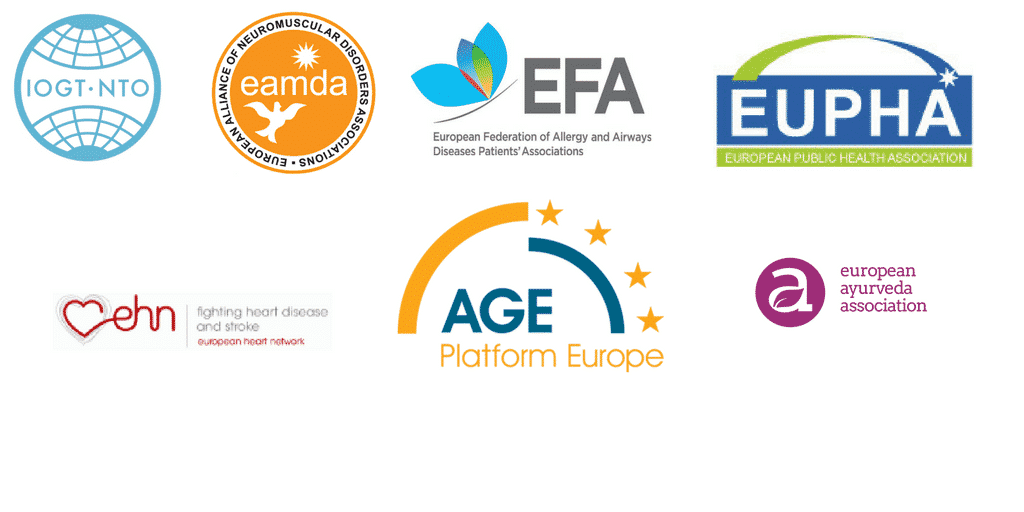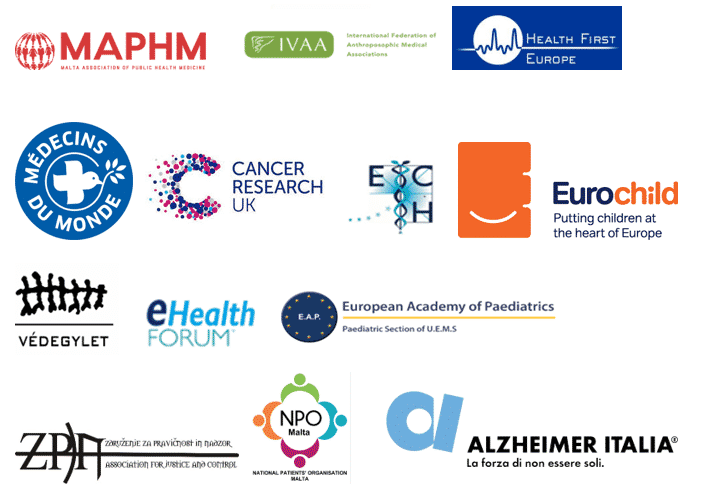Dear President Juncker, EU Health Collaboration is crucial for Europe’s future
2 Jun 17

6 June 2017
To: Jean-Claude Juncker, President, European Commission
cc: Frans Timmermans, First Vice-President, European Commission
Vytenis Andruikaitis, Commissioner, DG Health & Food Safety
Günther Oettinger, Commissioner, DG Budget & Human Resources
Carlos Moedas, Commissioner, Research, Science & Innovation
EU Health Collaboration is crucial for Europe’s future
Dear President Juncker,
We, the undersigned organisations, representing EU health stakeholders, wish to express our grave concern about the future of health in European policies and programmes, in the light of your White Paper on the Future of Europe, and propose an urgent meeting with you and your services on this topic.
Our determined view, shared by the vast majority of EU citizens, is that health is absolutely and unequivocally a core business of the EU. Protection of a high level of human health and wellbeing is entrenched in the Treaties of the European Union. EU collaboration in the field of health is indispensable for the future of Europe and rebuilding the trust of citizens in the European Union. We need more health to unlock the full potential of economic and social policies.
70% of Europeans want the EU to do more for health, according to the most recent Eurobarometer survey. With such a strong, unequivocal demand from EU citizens for more action in the field of health, it is essential that this is not only maintained, but actually enhanced. The EU needs to continue deliver results that make a tangible difference in the daily lives of its citizens and thus re-establish people’s trust in its institutions.
Health protection and improvement is a great success story of the European Union
Life expectancy is rising across the EU. Accession to the Union is positively correlated with health gains and longer lives. Without EU level action and support of the Health Programme, EU citizens would be more at risk from health threats. Whilst there is a need for continuous improvement, protection standards for patients, consumers and workers are amongst the highest in the world, thanks to EU legislation. Indeed, European integration and collaboration has brought great benefits for our health and provides vital resources for our health services: free movement of health professionals, health technologies and patients. We are assured of our right to treatment in other member states, under common minimum safety and quality standards. We are also reassured that, thanks to cross-border collaboration, highly specialised expertise will be shared across borders, as the EU has just embarked in one of its most promising transnational initiatives, the European Reference Networks for Highly Complex and Rare Diseases – an area not only where EU-wide strategies are effective, but also where the added value of EU action is striking.
This is thanks to EU legislation, rights and protections which complement national laws.
It is impossible to imagine a functioning internal market which does not consider and protect the health of its citizens, patients and consumers. Economic growth can only be built by healthy and resilient populations.
EU coordinated health action saves lives and reduces the burden of disease
By facilitating closer cooperation, the EU has saved countless citizens’ lives and contributed to their improvement. The Health Programme is a vital enabler for health policy formulation and for effective implementation and it has, over several years, triggered shared good practices on complex health topics for which EU cooperation is essential (such as patient safety and quality of care), encouraging upward convergence.
The conclusions of the previous Health Programme evaluation were extremely positive, with evidence of its impact beyond its relatively modest (financial) size, and exchange of knowledge and experience between member states which would not otherwise have taken place. Moreover, it “made it possible to develop many activities… where the economic situation and budget restrictions would not have allowed them to be made a priority” – now more critical than ever, when national health budgets are under even more pressure. The Programme was seen as providing value for money, and particularly important for ensuring a human rights-based approach to health policy.
We are therefore profoundly concerned that some of the scenarios in your White Paper on the Future of Europe would even consider reducing European action, cooperation and legislation and to step back from the protection and improvement of our health in Europe.
Instead, this role must be enhanced in the future through a new robust and ambitious Health Programme, convening member states to cooperate on health, underpinning vital collaboration with other institutions such as WHO and OECD and supporting health research.
Unprecedented health and social challenges can only be tackled at a European level
There has never been a stronger case, or a more vital moment for Europe to work together to protect our health.
Whilst life-expectancy has improved, the years gained are often lived in relatively poorer health due to the proliferation of preventable chronic diseases, compounded by huge disparities that persist within and between member states. Average life expectancy is 12 years shorter for a man in Lithuania than in Italy. Discrimination and inequality remains widespread when it comes to access to healthy living conditions and healthcare. For example, the lives of Roma people and refugees are expected to be 10 years shorter than national averages and homeless women in Europe die on average at just 43 years of age because of the multiple health disadvantages they face. The Lisbon Strategy included a target of adding two healthy life years across the EU by 2020, a target that still needs to be met.
Europe is facing important health threats which must become a top priority for this Commission. Our precious, life-saving antibiotics are declining in effectiveness. Antimicrobial resistance is taking hold more rapidly around the world than expected. No single country can tackle that challenge alone. Bacteria and drug resistance cannot be stopped by borders. The alternative if we fail to act is unimaginable: 10 million deaths globally every year by 2050. Rich countries will not be immune. Those of us from countries which take high quality healthcare systems for granted arguably have the most to lose.
National governments were expecting, and calling for, European Commission support in the form of a chronic disease strategy. The majority of Member States want more EU action for health, especially disease prevention and support to increase the safety, quality and efficiency of care, to aid their own efforts to make their health systems more sustainable.
Common challenges to Europe’s health systems require common action
National governments remain responsible for their health systems, but European health systems face common challenges – a necessary shift from disease-focused, hospital-centred care to person-centred, long-term chronic disease management where patients, families and communities play a key role.
Member States thus need cross-border support, in the form of expertise, coordination, exchange of data, evidence and best practices, and programme financing.
National governments cannot address the threats to health and health services alone. We face common challenges from drug-resistant infections, spikes in chronic diseases, obesity, alcohol-related harm, infectious diseases, emerging technologies, rising prices of medicines, and inequities in access to healthcare, that can be tackled together far more effectively.
Looking ahead: Commit to Health and Sustainable Development
Looking ahead, the EU must not shy away from stronger engagement in the field of health. On the contrary, the challenges we are facing and the opportunity to continue demonstrating to European citizens the added value of the EU action on health, compels health to become a EU flagship policy that promotes stronger protection for patients and consumers and ultimately improves people’s lives.
If the EU steps back from protecting patients and consumers and improving our health it would irreparably damage the institutions’ credibility and trustworthiness.
Therefore, a strong future Health Programme is crucial, not least to ensure that voices from civil society – patients, consumers, health professionals, epidemiologists and technical experts – are represented in policy dialogues which build on all available evidence and expertise.
For this we need strong high-level leadership inside the Commission, with specific responsibility for health. Mainstreaming health in other Commission Directorates will not work without stimulus, guidance, knowledge, expertise, and leadership from a strong Directorate for Health.
This is evidenced by recent developments on the Digital Health Agenda, and the symbiotic relationship between DG SANTÉ and DG CONNECT. Other EU policies will be jeopardised without an appropriate health policy lens. Efforts around the Social Pillar and the European Solidarity Corps are not replacements for health leadership within the Commission but rather, should be highly complementary measures to ensure maximum impact on the ground.
The EU has committed to deliver the UN Sustainable Development Goals both within the EU and globally, with a key goal on health.
Health is also high on the international policy agenda – the G20 under Germany’s leadership is discussing antibiotic resistance. This is because health and access to good quality healthcare and social care are primary concerns for everyone. Yet international institutions lack the mechanisms for real implementation that make a difference to people’s daily lives.
This makes the EU’s role – and the necessity to do more, not less – absolutely key. This also requires health leadership and expertise within the Commission working in concert with the health community.
In conclusion:
We call for an enhanced EU action in the field of health that brings the EU closer to its citizens, by protecting patients and consumers and improving people’s health. We call for a EU action on health that fosters cross-country collaboration, integrates the action of Member States and helps them to address the unprecedented challenges we are facing. We call for EU action on health supported by a robust EU Health Programme and the leadership of a dedicated Directorate in the European Commission.
We request a meeting with you at your earliest convenience to explore these issues in more detail and agree a viable way forward.
Yours sincerely,
Archie Turnbull Marco Greco
President President
European Public Health Alliance European Patients Forum
Supporting Organisations
Who is on board?
Access to Medicines Ireland
Active Sobriety, Friendship and Peace
AGE Platform Europe
Alcohol Action Ireland
Alzheimer Albania
Alzheimer Bulgaria
Alzheimer Europe
Alzheimer Nederland
Alzheimer Portugal
Alzheimer Society of Finland
Alzheimer Switzerland
Alzheimer Uniti Italia
Angioedema Belgium
Anonymous AIDS Association
Asociación en defensa de la Sanidad Publica de Castellón (ACDESA – Castellón)
Asociatia Centrul Rromilor “Amare Rromentza”
Asociatia de Sprijin Pentru Grupuri Expuse Riscului de Excluziune Sociala (ASGERES)
Asociatia Evanghelie Zappa-Brosteni
Asociatia Partida Romilor Pro-Europa
Asociatia pentru Incluziune Sociala “Proetnica”
Asociatiei Nationale Miastenia Gravis Romania
Associaçao Portuguesa Hospitalização Privada (APHP)
Associação Protetora dos Diabéticos de Portugal (APDP)
Association Fibrose Pulmonaire Idiopathique Pierre Enjalran (APEFPI)
Association for Culture, Education and Communication (ACEC)
Association for Inherited Metabolic Diseases “Aspida Zois”
Association for Justice and Control, Slovenia
Association for Natural Medicine in Europe (ANME)
Association Française du Syndrome Phelan-McDermid
Association Internationale de la Mutualité (AIM)
Association nationale de prévention en alcoologie et addictologie (ANPAA)
Association of European Cancer Leagues (ECL)
Association of Private Hospitals of Austria
Associazione Italiana Chiropratici (AIC)
Azienda ULSS n.3 “Serenissima” Venezia
Barcelona Institute for Global Health (ISGlobal)
Belgian Association of Public Health
BEUC
Bulgarian Society of Patients with Pulmonary Hypertension
Cancer Focus Northern Ireland
Cancer Research UK
Catholic University of the Sacred Heart Rome
Center for Education and Human Rights
Centre for Health and Development Murska Sobota (CZR)
Centro de Investigación Biomédica en Red de Enfermedades Respiratorias (CIBERES)
CHEM Trust
Center for International Environmental Law (CIEL)
Center for Regional Policy Research and Cooperation (STUDIORUM)
Center of Allergy & Immunology
Center of Resources fo Social Inclusion (CRIS)
Center of Resources for Community
Center Women and Modern World (WMW)
CLCV Oise France
Cyprus Federation of Patient organisations
Debra Belgium
Duchenne Parent Project
Dunare.EDU
Dutch Liver Patients Association
eHealth Forum
ERN-LUNG
EKPIZO
Eurochild
European Academy of Allergy and Clinical Immunology (EAACI)
European Academy of Paediatrics (EAP)
European AIDS Treatment Group (EATG)
European Alcohol Policy Alliance (Eurocare)
European Alliance of Neuromuscular Disorders Associations (EAMDA)
European Anti-Poverty Network (EAPN)
European Association for Senior Hospital Physicians (AEMH)
European Association of Hospital Pharmacists (EAHP)
European Association of Primary Care Partners (EAPCP)
European Association of Service Providers for Persons with Disabilities (EASPD)
European Association for the Study of the Liver (EASL)
European Ayurveda Association (EUAA)
European CanCer Organisation (ECCO)
European Cancer Patient Coalition (ECPC)
European Central Council of Homeopaths (ECCH)
European Chiropractors’ Union (ECU)
European Committee for Homeopathy (ECH)
European COPD Coalition (ECC)
European Council of Optometry and Optics (ECOO)
European Critical Care Foundation (ECCF)
European Digital Peer Citizen Patients Alliance (EuDiPPA)
European Disability Forum (EDF)
European Federation of Allergy and Airways Diseases Patients’ Associations (EFA)
European Forum For Primary Care (EFPC)
European Federation of Families of People with Mental Illness (EUFAMI)
European Federation of National Organisations Working with the Homeless (FEANTSA)
European Federation of Patients’ Associations for Anthroposophic Medicine (EFPAM)
European Federation of Salaried Doctors (FEMS)
European Fresh Produce Association (Freshfel Europe)
European Haemophilia Consortium (EHC)
European Health Management Association (EHMA)
European Hematology Association (EHA)
European Heart Network (EHN)
European Institute for Women’s Health (EIWH)
European Kidney Health Alliance (EKHA)
European Liver Patients’ Association (ELPA)
European Medical Students’ Association
European Multiple Sclerosis Platform (EMSP)
European Network of Fibromyalgia Associations (ENFA)
European Network of Medical Residents in Public Health (EuroNet MRPH)
European Network for Smoking and Tobacco Prevention (ENSP)
European Parkinson’s Disease Association (EPDA)
European Partnership for Improving Health, Equity & Wellbeing (EuroHealthNet)
European Patients’ Forum (EPF)
European Pharmaceutical Students´ Organisation (EPSA)
European Platform Patient Organisations Science and Industry (EPPOSI)
European Public Health Association (EUPHA)
European Public Health Alliance (EPHA)
European Public Health Centre (EPHC)
European Regional and Local Health Authorities (EUREGHA)
EURORDIS Rare Diseases Europe
European Region of the World Confederation for Physiotherapy
European Respiratory Society (ERS)
European Roma Rights Centre (ERRC)
European Society of Anaesthesiology
European Shiatsu Federation
European Specialist Nurses Organisations
European Umbrella Organisation for Psoriasis Movements (EUROPSO)
European Union of Private Hospitals (UEHP)
FECMA Federación Española de Càncer de Mama
Federazione Italiana Alzheimer
Fertility Europe
Finnish National Institute for Health and Welfare – THL
Fipra International
France Assos Santé
Frankfurt School of Finance and Management
Friends of the Earth Europe
Fundación de Ciencias del Medicamento y productos sanitarios (FUNDAMED)
Fundación Secretariado Gitano
Fundamed
Fundatia Baylor Marea Neagra
German Alzheimer Association
GesundheitsAkademie e.V. Bielefeld
Global Alliance of Mental Illness Advocacy Networks-Europe (GAMIAN Europe)
Global Health Advocates (GHA) France
Global Health Mentorships
Hälsan & Arbetslivet, Region Västra Götaland
HCWH Europe
Health Action International (HAI)
Health Care Without Harm Europe (HCWH)
Health Equalities Group
Health First Europe
Hellenic Cancer Federation – ELL.O.K.
HTAP Belgique
Hungarian Allergy Association
Hungarian Alliance for Tobacco Control
Hungarian Federation of People with Rare and Congenital Diseases Network (HUFERDIS – RIROSZ)
Hungarian Medical Association of the United Kingdom (HMA-UK)
Hungarian Osteoporosis Patient Association (HOPA)
Hunger And Thirst Foundation
Inclusion Europe
IndustriAll European Trade Union
Institute Cancer De La Loire Lucien Neuwirth
International Federation for Spina Bifida and Hydrocephalus (IF)
International Federation of Anthroposophic Medical Associations (IVAA)
International Federation of Medical Students Associations (IFMSA)
International Medical Cooperation Committee Denmark (IMCC)
International Step by Step Association (ISSA)
International Primary Care Respiratory Group (IPCRG)
IOGT International
IOGT-NTO
Irish Lung Fibrosis Association
Istituto Superiore di Sanità
Jagiellonian University Medical College
Johannes Kepler University Linz
Just Treatment
Lega per la Neurofibromatosi 2 Onlus
Liceu de Dones
Life Quality Improvement Organisation (FLIGHT)
London School of Hygiene & Tropical Medicine
Longfibrosepatientenvereniging
Lund University
Lung Cancer Europe (LuCE)
MAIS PARTICIPAÇÃO, melhor saúde
Malta Association of Public Health Medicine (MAPHM)
Malta Continence Care Association (MCCA)
Malta Dementia Society
Malta Health Network (MHN)
Médecins du monde
Mediterranean Roma Associations Federation (AKROMFED)
Mental Health Europe (MHE)
Multiple Sclerosis Society – Malta
National Association of Pensioners – Malta
National Center for Rare Diseases (ISS)
National Institute of Health of Italy
National Institute of Public Health of Slovenia
National Patients’ Organisation – Malta
NIPH Kosovo
Osteogenesis Imperfecta Federation Europe (OIFE)
Panhellenic Federation of Alzheimer’s Disease and Related Disorders
PSC Patients Europe
Pensionistenverband Österreichs
Platform for International Cooperation on Undocumented Migrants (PICUM)
Polish Society for Health Programs (PSHP – PTPZ)
Programmes of Development of Social Support and Medical Co-Operation (PRAKSIS)
Pulmonale Hypertensie (HTAP)
Rare Disease Organisation Belgium (RaDiOrg)
Retina International
Roma Cultural Center O Del Amenca
Rroma Center “Amare Rromentza”
Romani CRISS
Romanian Cancer Society
Romanian National Alliance for Rare Diseases
Royal College of Physicians (RCP London)
SAFE – Safe Food Advocacy Europe
SALUS Charitable Foundation
SCImPULSE Foundation
Scottish Health Action on Alcohol Problems (SHAAP)
Slovenian Homeopathic Society
Smoke Free Partnership (SFP)
Società Italiana di alcologia (SIA)
Social Platform
SOIF DE VIE
SOS Hépatites Fédération
Société Française de Santé Publique (SFSP)
Suomen ASH
Swedish Network for International Health (SNIH)
Tallin Children’s Hospital Foundation (CHF)
The Alzheimer Society of Ireland
The Association of Schools of Public Health in the European Region (ASPHER)
The Cyprus Alzheimer Association
The European Idiopathic Pulmonary Fibrosis & Related Disorders Federation (EU-IPFF)
The Salvation Army, EU Affairs Office
Transparency International – Pharmaceuticals and Healthcare Programme
University of Konstanz
University of L’Aquila
University of Tampere
Usher Syndrome Coalition Forum Austria
Védegylet Egyesület
Vie & Cancer
Women’s Brain Project
W.Z.C. Domino
WEMOS
World Federation for Incontinence Patients (WFIP)







